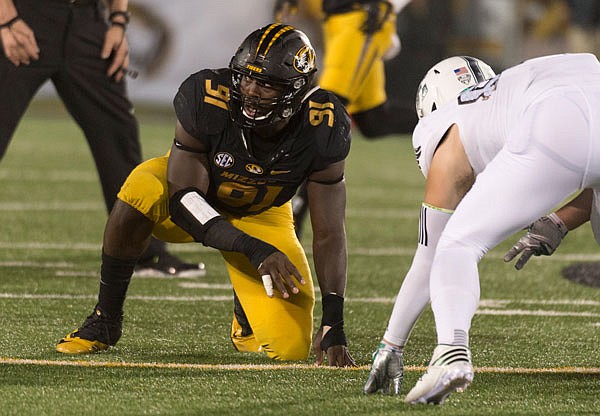COLUMBIA - Charles Harris is still adjusting to Missouri's new defensive system.
In fact, most of his teammates have yet to fully make the transition to first-year defensive coordinator DeMontie Cross' gap scheme.
Under longtime defensive line coach Craig Kuligowski, Missouri's defensive linemen essentially had more free reign to rush the pocket, which previous defensive coordinator and current head coach Barry Odom didn't deviate from last year. That helped lead to Missouri's reputation as "D-Line Zou," which produced defensive linemen who put up big sack numbers and tackles for loss before becoming NFL draft picks.
In the past few seasons, Missouri developed household pass rushers Sheldon Richardson, Michael Sam, Kony Ealy, Shane Ray, Markus Golden and now Harris in what was previously a scheme based on instinctively reading the play and reacting.
This season, Cross stresses making sure the defensive linemen have more "gap integrity" by plugging up the gaps between the offensive linemen so the opponent doesn't have a lane to run up the middle.
"We're a gap scheme," Cross said. "I just know (defensive linemen) have always been the guys who have gotten the glory. We still want the same thing. Our structure is different in how we get there. I think that's been the biggest adjustment and a little frustration."
"When there is any type of doubt or hesitation or drawback on what they used to do it shows up."
Cross said his players know the defense well, and even said they look pretty good when they execute it properly. At this point, he is more concerned with missed tackles - that is what Cross said played into Eastern Michigan picking up 428 total yards and 21 points, more so than scheme adjustments.
Charles sees them executing their new scheme with success in practice. He confirms it has yet to fully transition onto the playing field on Saturdays.
Missouri's defensive linemen only have 3.5 tackles for loss and one sack - all but the half-tackle for loss coming from defensive tackle Josh Augusta.
Harris only has five total tackles after leading the Southeastern Conference with 18.5, while also adding eight sacks. Still, he is confident those numbers will go up as he gets more time on the field in the new scheme. After all, he is adjusting from one he found success in.
"I'm not saying anything bad, but whenever you change something that was working so well and you change it that's frustrating for anybody," Harris said. "But it's a matter of if you're going to adjust to it or if you're going to keep fighting it. We basically came to the conclusion that we've got to work with it.
"We can't keep fighting, or they'll get somebody else in there to play. We've got to adjust no matter what it is."
The redshirt junior defensive end admitted there are other things for him to improve on besides continuing to adjust. Get off his man faster. Read the play better. Make connections mentally in his head.
He is confident it will only take one sack before the rest start rolling in.
"I've got to do it on my own and work the bags more, get my reps better, that's what I've got to do," Harris said. "Just little things like that will transition into bigger plays."
Despite the lack of big numbers, defensive line coach Jackie Shipp is not disappointed with his unit so far. The sacks might not have come, but he likes the pressure and hits on the quarterbacks the Tigers are generating, causing rushed throws.
That has an effect seen elsewhere on the scoresheet.
Missouri is only giving up 6.6 yards per pass attempt. The team already has four interceptions - tied for the third most in the country - after only having nine last year.
"Tell me how many deep balls we've gotten," Shipp said, "it's more of a quick passing game."
Still, Shipp said Missouri has left room for improvement in stopping the run. The Tigers have given up on average 191 yards on the ground against West Virginia and Eastern Michigan.
Now they are tasked with stopping Georiga's Heisman contender Nick Chubb, who put himself on the college football map the last time the Bulldogs went to Columbia.
Georgia's running back rushed the ball 38 times for 143 rushing yards and a touchdown while filling in for an injured Todd Gurley. The junior running back proceeded to have at least 113 yards in his next dozen games before tearing his PCL on his first carry against Tennessee last Oct. 10.
In his first game back against North Carolina on Sept. 3, Chubb ripped off 222 yards against the Tar Heels. But FCS opponent Nicholls limited him to 80 yards on 20 carries.
The Colonels might have given the Tigers a blue print on how to stop him.
"They did an outstanding job of getting a lot of hats to the ball, and obviously that took a lot of his confidence and momentum away," Cross said, "and as a team we've got to do the same against him. You can put on any tape against any team and rarely does the one guy get him down, I don't care who he's playing."
Shipp is also stressing swarming to and gang tackling Chubb in practice this week. His main focus is stopping the run and making Georgia one-dimensional.
That's when the sacks can start coming in bunches.
"Put them in third and long, put them in those situations where you get more opportunities to rush the passer," Shipp said, "but the main thing is stopping and containing the run."

